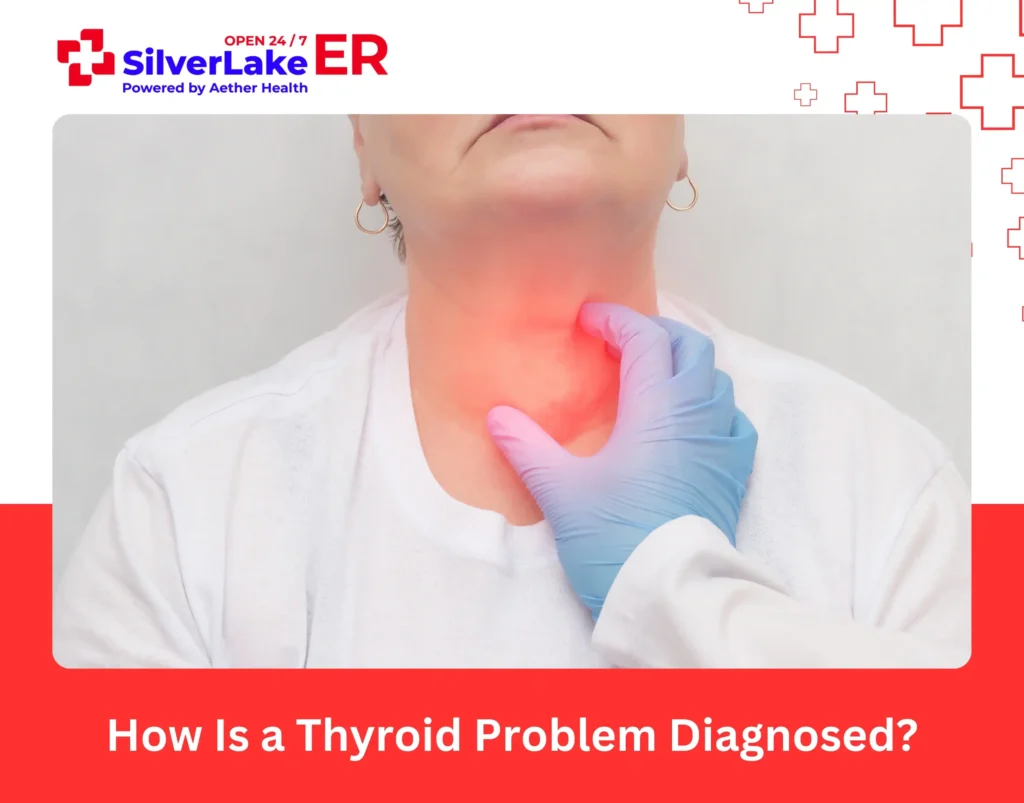You’re exhausted all the time, gaining or losing weight without trying, or noticing your mood is all over the place. It might not just be stress or aging. It could be your thyroid trying to get your attention.
Your thyroid controls your metabolism, which affects almost everything in your body. So a thyroid problem can throw your entire system out of balance.
Nearly 20 million Americans live with thyroid disease, yet up to 60% remain undiagnosed.1 It’s because symptoms develop gradually and mirror other conditions.
Let’s walk you through how to tell if you have thyroid issues, what the thyroid does, the common warning signs, and when to seek medical help.
What Is the Thyroid and Why Is It Important?

The thyroid is a small, butterfly-shaped gland in the front of your neck. Though small, it plays a big role in your health. It produces hormones that regulate your metabolism, body temperature, heart rate, and how fast your brain and digestive system work. When your thyroid isn’t working properly, it can go one of two ways:
- Hypothyroidism: When your thyroid doesn’t make enough hormones (underactive thyroid).
- Hyperthyroidism: When your thyroid makes too much hormone (overactive thyroid).
How To Tell If You Have Thyroid Issues: 7 Common Symptoms
1. Unusual Fatigue
Fatigue is one of the most common and earliest signs of a thyroid problem.
Hypothyroidism: Your body slows down, making you feel drained and sluggish.
Hyperthyroidism: Make you feel tired because your body is in overdrive all the time.
2. Changes in Weight
If you’re struggling to maintain your usual weight, your thyroid might be to blame.
Hypothyroidism: Sudden weight gain without a change in diet or activity may be due to an underactive thyroid.
Hyperthyroidism: Unexplained weight loss could point to an overactive thyroid.
3. Feeling Too Cold or Too Hot
Do you constantly reach for a sweater when everyone else is comfortable? Or do you feel too warm, even in a cool room? These could be signs that your metabolism is off, often due to thyroid hormone imbalances.
Hypothyroidism: You feel cold all the time.
Hyperthyroidism: You overheat and sweat easily.
4. Mood and Memory Issues
Thyroid problems also affect your brain.
Hypothyroidism: You may experience depression or brain fog.
Hyperthyroidism: Brings anxiety, irritability, or restlessness.
5. Changes in Heart Rate
Your thyroid hormones help regulate your heart rate and how forcefully your heart contracts.
Hypothyroidism: Your heart slows down, and you feel tired, cold, or sluggish.
Hyperthyroidism: You have a rapid or irregular heartbeat could signal hyperthyroidism.
6. Hair, Skin, and Nail Changes
Hypothyroidism: Dry skin, brittle hair, and thinning eyebrows are the signs of an underactive thyroid.
Hyperthyroidism: Thinning hair and soft, moist skin is possibly hyperthyroidism
7. Neck Swelling or Lump
A swollen neck or a visible lump may mean your thyroid gland is enlarged, a condition known as a goiter. It can happen with both hyper- and hypothyroidism and should be evaluated by a doctor.
What Causes Thyroid Problems?
Thyroid issues often arise from autoimmune diseases or lifestyle factors. The most common causes include:
- Hashimoto’s thyroiditis
- Graves’ disease
- Thyroid nodules
- Iodine imbalance
- Medications or radiation exposure
How Is a Thyroid Problem Diagnosed?

If you notice multiple symptoms listed above, don’t self-diagnose—visit your nearest emergency room. Here’s how to tell if you have thyroid issues through the following tests and imaging.
Blood Tests: Check your TSH (thyroid-stimulating hormone) and other levels to see how your thyroid is performing.
- T3 and T4 hormone levels
- Thyroid antibody tests (to check for autoimmune causes)
- Thyroid ultrasound (if nodules are suspected)
- Physical Exam: Your doctor will inspect your neck while you swallow to check for visible swelling or lumps. Then, they’ll gently palpate your thyroid to feel size, shape, and any unusual texture.
How Are Thyroid Issues Treated?
Whether hypothyroidism or hyperthyroidism, the goal is to get your hormone levels back to a healthy balance.
For Hypothyroidism (Underactive Thyroid):
The most common treatment is a daily thyroid hormone pill called levothyroxine. It replaces the hormone your body isn’t making enough of and helps boost your energy, metabolism, and mood.
For Hyperthyroidism (Overactive Thyroid):
There are a few options, depending on what’s causing it and how severe it is:
- Anti-thyroid medications: These slow down the thyroid’s hormone production.
- Radioactive iodine: This gently destroys part of the overactive thyroid.
- Surgery: In some cases, doctors may remove part or all of the thyroid.
- Beta-blockers: These don’t fix the thyroid itself, but they help calm down symptoms.
Important Note: Never self-diagnose. Starting treatment without medical supervision can lead to serious side effects.
After Treatment
If your thyroid is removed or permanently slowed down, you’ll likely need lifelong thyroid hormone replacement. Don’t worry It’s manageable and safe. Regular checkups and blood tests help keep your levels in check.
When to Go to the Emergency Room for Thyroid Issues?
You should seek immediate medical assistance if you experience:
- Ongoing fatigue
- Unexplained weight changes
- Mood changes or memory issues
- Irregular heartbeat
- Neck swelling
- Menstrual irregularities
- Sensitivity to cold or heat
Can Diet or Lifestyle Help with Thyroid Issues?

While lifestyle changes alone can’t cure thyroid disorders, they can support overall thyroid health:
- Eat a balanced diet
- Avoid extreme low-calorie diets
- Manage stress
- Get regular exercise
Final Thoughts
Knowing how to tell if you have thyroid issues can make a big difference in your health and quality of life. These conditions are common and treatable, but they often go undetected. If you notice multiple symptoms like fatigue, weight changes, mood swings, or feeling too cold or hot, don’t ignore them.
At ER Silverlake, we’re here 24/7, mornings and midnights, to help whenever you need it. Our emergency team quickly checks your thyroid levels, runs on-site lab tests, and gets you the relief you need fast. You deserve to feel like yourself again.
FAQs
1. What are the early signs of thyroid problems?
Fatigue, weight changes, mood swings, hair thinning, dry skin, and changes in heart rate are some common early signs of thyroid dysfunction.
2. Can thyroid issues cause anxiety or depression?
A: Yes. Both hyperthyroidism and hypothyroidism can affect your mental health. Anxiety is more common with an overactive thyroid, while depression often occurs with an underactive thyroid.
3. How is thyroid function tested?
A: A simple blood test called the TSH (thyroid-stimulating hormone) test is commonly used. Doctors may also check T3, T4, and thyroid antibody levels for a full assessment.
4. Are thyroid problems more common in women?
A: Yes. Women are about 5 to 8 times more likely than men to develop thyroid disorders, especially after pregnancy or during menopause.
5. Can I live normally with thyroid disease?
A: Absolutely. With proper diagnosis and treatment—like medication or hormone therapy—most people with thyroid conditions can lead healthy, active lives.




